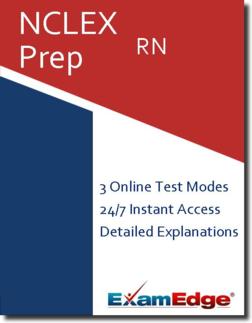
Graduating from nursing school is exciting. There are few things more thrilling than crossing the stage and grabbing your diploma after years of hard work. With your knowledge and skills proven in both the classroom and clinical settings, there's only one thing standing between you and the career of your dreams: a passing score on the NCLEX.
Before you can work professionally as a licensed Registered Nurse , you'll need to take and pass the NCLEX Registered Nurse exam. Designed to assess the competency, knowledge and practical application of the skills typically learned in nursing school, the exam is considered the gold standard for qualifying new healthcare professionals. With a little preparation, a passing score on the NCLEX RN is completely attainable, especially if you've done well in nursing school.
You'll need more than just great grades to pass the NCLEX exam, though. While a solid foundation in the principles of nursing will certainly set you up for success, even the best nursing students often struggle with this challenging test. To ensure the best possible outcome, it's smart to begin studying at least one or two months ahead of your test date. As you map out your study schedule, consider trying these strategies for the NCLEX Registered Nurse exam:
Get Familiar with the Format
The NCLEX Registered Nurse exam may be unlike any other test you've ever taken before. That's because it leverages computerized adaptive testing to ensure no two exams are exactly alike. Your performance on the first question will dictate the second question's degree of difficulty, and so on. Computerized adaptive testing means there's no set amount of questions, either – you could face as few as 75 items or as many as 265 questions during your testing window. So long as you answer 95 percent of questions correctly, though, you'll earn a passing score.
This style of standardized testing can be frustrating. Many examinees try to interpret their performance based on the presumed level of difficulty of each question they are asked. Dwelling on whether a given NCLEX question was difficult or easy can take up valuable time and cause you to second guess your answers. If you're hoping to get familiar with the format of the test without getting too in your head about the degree of difficulty of each item, consider answering a few NCLEX practice questions ahead of your exam date. You'll feel more comfortable with the adaptive nature of the test when it comes time to take the real thing!
Forget What You've Learned During Your Internship
It might sound counterintuitive, but it actually pays to push first-hand experience out of your mind as you sit for the NCLEX RN. The test is based on the latest research and best practices, and the work you do in a clinical setting may differ significantly from what's recommended in a textbook. Even if the procedures and techniques you've learned in such experiences are just as safe or effective as the methods advised by your textbook, it's best to stick with the official research-based skills recommended by the academics.
It can be difficult to get into this frame of mind, but applying a real world approach to a theoretical situation on a test can lead you astray. Instead of contextualizing NCLEX questions in the healthcare facilities you're most familiar with, work to make connections with the things you learned in the classroom. Assume you're working with endless time and resources when a situational question arises on the NCLEX – real life might be different, but you're taking a test, not treating a patient.
Schedule a Study Date with Yourself
Many nursing students envision themselves pulling all-nighters in the library in preparation for the NCLEX RN. Others plan to diligently chip away at test prep, answering NCLEX RN practice questions daily. No matter your strategies for the NCLEX Registered Nurse exam, make sure to carve out time specifically for test prep. At times, assignments for class, social events, and work may supersede your intentions to study, but if you have a firm time commitment on the books, you'll be less likely to shrug off plans to prepare.
It may help to think of NCLEX preparation as a part-time job. For a month or two ahead of your exam, schedule time each week to review test prep resources, answer NCLEX questions, and meet with study buddies to quiz one another. Even five or six hours a week can have a tremendous impact on your performance – but you have to put in the time and effort, not just procrastinate on your studying.
Take NCLEX RN Practice Tests
Time and time again, research shows that practice testing is one of the best forms of exam prep. The technique is effective because it trains your brain to look for patterns and retrieve relevant information more quickly, all while helping you get more comfortable with the pacing, format and structure of the real NCLEX RN. Test prep should be just as much about learning test-taking strategies as it is about cramming facts and figures into your memory. NCLEX practice questions help you do both at the same time.
Exam Edge features hundreds of practice questions for students preparing for the NCLEX Registered Nurse exam. With options to pause the test or to set the pace to match the real exam timing, you'll get the chance to experience the NCLEX on your own terms. Detailed explanations for each question can help inform your studies, pinpointing areas where you didn't know you needed focus.
Eager to try out our practice tests yourself? We offer free sample practice tests for new users. Click here to get started! We know you'll love the convenience and affordability of our resources.
Related Practice Tests
Blogs related to: 4 Strategies to Pass the NCLEX Registered Nurse Exam


-exam.webp)

 NCLEX RN
NCLEX RN
